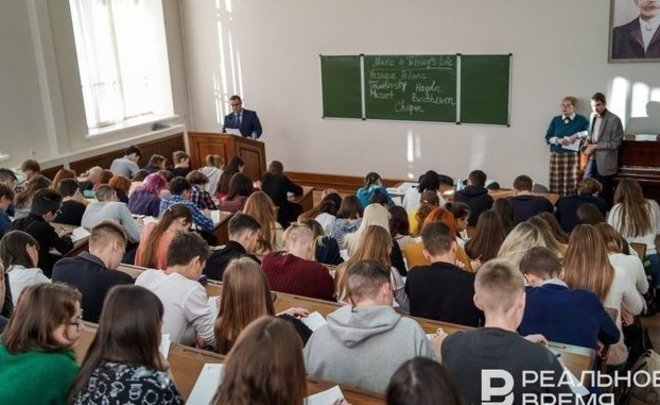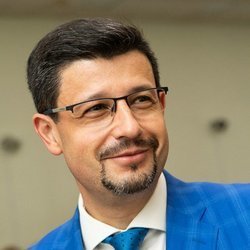The cost of diploma in Tatarstan: should one study IT for 800k a year?
Realnoe Vremya about prices for popular university degrees, chances of qualifying for state-funded places and the end of fee-based higher education

The admission campaign is about to start in Tatarstan universities soon. Realnoe Vremya analysed graduates’ chances of qualifying for state-funded and fee-based places for popular and unpopular degrees as well as university graduates’ prospects for the future. Read more in our analytic report.
Which university is easier to enter
The passing score for people entering Russian universities has remained unchanged for many years now — the Ministry of Science and Education has been annually confirming the same minimum score for subjects.
However, universities have the right to set their own threshold — above this minimum. And here everything depends on the demand for some speciality. Those who are simply unlucky to have a low score stay and try to go to study in an institution with the lowest bar, those who are very unlucky will choose the degrees whose tuition fees will suit their family’s pocket.
The passing score for people entering Russian universities has remained unchanged for many years now
Kazan National Research and Technological University has fixed the lowest final exam score — just 119 — for potential students with funded fees for specialities that are complicated and popular in enterprises. The threshold for freshmen of the Kazan brand of the Russian Law Academy turned out to be a bit higher — 131. While Kazan Federal University fixed a low bar for those who want to dedicate their life to nanotechnologies. The highest among the lowest passing scores is at Russian State University of Justice for Law degree.
Who has cheaper higher education?
Those who are ready to pay for education need to score two or three times fewer points but they also need to win the “wallet competition.” The cheapest education is for those who agree to get a diploma of a linguist in theory and method of teaching foreign languages and cultures by Russian Islamic Institution: 30,000 rubles a year and you get it. Paying 50,000 rubles a year one can study marketing at Social Education Academy. While a year of education at Russian Cooperative University costs 81,000 rubles in Business Informatics.
Education for would-be jurists in various universities will cost from 101,000 rubles a year — no matter if they study civil or criminal law.
It is a bit more expensive to become an accountant. The tuition fees for specialists in informatics costs from 116,000 a year.
45,000 between manager and veterinarian
Scoring the lowest points in final exams, one can study different areas of management for little money (116-130,000 rubles at Kazan State Power Engineering University and Kazan State University of Architecture and Engineering) and pay more (140-160 at Kazan National Research and Technological University).
One can study political studies, pedagogy, economics, logistics and statistics, tourism for 130-140,000 rubles a year. Future pharmacists and veterinarian will have to pay over 160,000 rubles for a year of study — like future translators.
Would-be designers will need quite a big safety cushion — the training in apparel design at Kazan National Research and Technological University costs 177,600 rubles a year. And future physical training specialists at Volga State University of Physical Culture, Sport and Tourism are ready to pay 178,800 rubles a year. Those who want to work in the oil and gas industry will have to pay more — 191,100 rubles a year.
But the biggest price tag is at Innopolis University — it asks 800,000 rubles for a year of study of Information System Engineering.
Which university appreciates itself more?
Requests of Kazan universities are as different as prices for diplomas in different specialities. Russian Islamic Institute, Social Education Academy and Russian University of Cooperation are the top 3 that’s ready to teach for a modest sum.
They are followed by the Kazan branch of the Kazan International Tourism Academy and the Institute of Management and Economics — the education is about 100,000 rubles there. Students of the Kazan branch of Russian State University of Justice and Kazan State Agrarian University are demanded to pay a bit more than 100,000. Then it is Kazan State Power Engineering University and Kazan State University of Architecture and Engineering.
At Kazan Federal University, the tuition feeds depend on the degree — some can be obtained for 132,000 rubles a year while some — for 162,500. Kazan National Research and Technological University teaches for 139-191,000 rubles a year. Innopolis University is the most expensive institution.
“This market of professions is seriously overheated”

Lopatin considers that the fact that they have guaranteed public funding doesn’t push public universities to changes. He considers that only some specialities are going to be paid for soon — first of all, it is the trendy and demanded IT sector. However, such graduates don’t have promising prospects:
“I am convinced that this market of professions is seriously overheated and is already starting to cool down. The presence of digital artificial intelligence is already making low-quality specialists, so-called juniors, unnecessary. Their salaries will soon become low, artificial intelligence that doesn’t need to be paid will replace them.”
Andrey Lopatin thinks that doctors’ training is more promising and sought-after: doctors are always in demand, and this profession will guarantee a slice of bread with butter anytime.
“However, a doctor’s job isn’t always well paid, while the training received isn’t always good,” he noted.
But it isn’t always reasonable to pay for training of engineers, thinks Lopatin:
“Despite the talks about how engineers are important and needed, salaries in this sector aren’t high. And this is why despite a big number of state-funded places, universities aren’t covered by a wave of people willing to choose these areas.”
Also, he added that another important process was taking place in Russian regions that would reduce universities’ chances of selling fashionable specialities:
“If parents see some enterprise operates successfully in their city, it has a good salary and specialists are needed there, they will persuade the child to choose the profession this enterprise needs.”
“The fee-based component started to decline”
“Tuition fees are just a pleasant additive that allows the university to do additional tasks, solve some problems,” Lopatin thinks and predicts commercial universities a dawn:” This additive is not a must-have component and it started to decline because the birth rate is falling, there are fewer applicants but there are a lot of state-funded places, moreover, parents and children’s purchasing power is falling. Unfortunately, this is why private university haven’t started to work really.”
Now, he says, many school graduates don’t want to take united state exams — they go to colleges, moreover, the college isn’t popular because of its demand but mainly because there is a chance of bypassing united state exams and then enter a university:
“Parents don’t want their child to be stressed in any case, no matter if they are going to study at university or not. But those who will enter universities will likely claim a state-funded place whose number is enough, as it has already been said.”
There are fewer applicants and a lot of state-funded places
Alexey Lopatin partly agreed with the assumption that the flow of people willing to enter prestigious Moscow and Petersburg universities even with tuition fees won’t stop. He noted that applicants go to big cities not to get good education, because it can be obtained in strong universities in the outskirts, but for a prospect of finding a good job after graduation. Given that the purchasing power of the population is falling and incomes in the backwater are, as a rule, lower than in capitals, he supposed that good final exam score will allow strong graduates to enter a desirable educational institution for free, those who won’t be able to enter such universities with their score will unlikely be able to qualify for a fee-based alternative — out of depth.